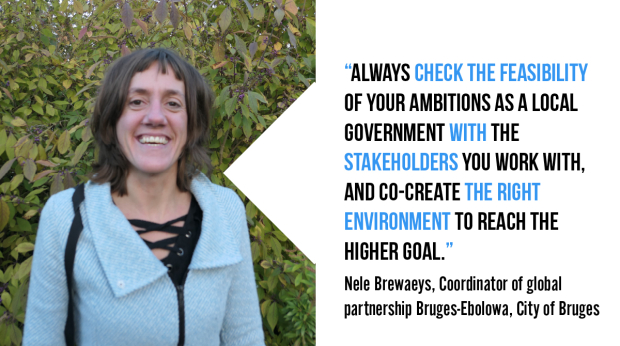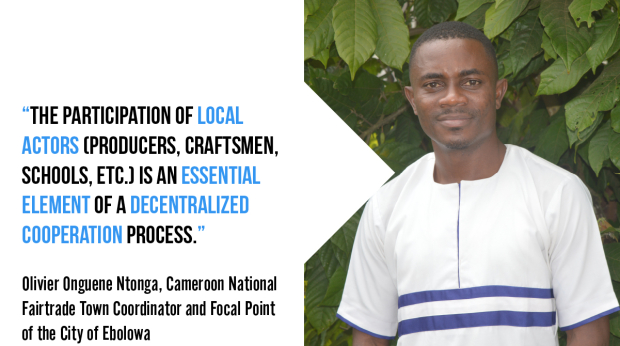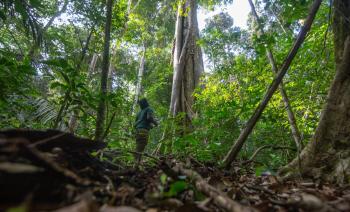This article is also available in French.
Cities are home to more than half of the world’s population and 80% of the global economic output.1 They lead the way as pioneers on sustainability issues, developing innovative solutions for environmental, social and economic challenges. Better knowledge about specific local conditions allows the development and promotion of context-specific solutions that are more likely to resonate with citizens, thus having greater impact. Cities play a crucial role in achieving the SDGs, and city-to-city alliances are steadily emerging. The partnership between Bruges, Belgium, and Ebolowa, Cameroon, highlights the potential of synergies among the Global South and Global North.
Through policies and funding instruments such as the Aid for Trade (AfT) strategy and the EU External Investment Plan (EIP)2, the EU aims to support partner countries often facing internal constraints which prevent them from accessing the economic benefits of expanded trade. Moreover, EU initiatives such as the EU Cities for Fair and Ethical Trade Award focus on EU citizens’ awareness of the external trade realities and the role that purchasing decisions play in supporting better trade.
Bruges and Ebolowa for a more sustainable chocolate value chain
The chocolate market is dominated by a small number of large enterprises, with more than 50 million people depending on cocoa production worldwide. Cocoa producers today receive only 6% of the price consumers pay for their chocolate bar, down from 16% in the 1980s. According to the cocoa barometer, a cocoa producer earns just 0,85USD per day, with farmer poverty having repercussions on child labour and deforestation.
Against this backdrop, the city of Bruges, Belgium, and the city of Ebolowa, Cameroon, have agreed on a Fair Trade cooperation with the aim of promoting a more sustainable chocolate chain. With its signing in 2020 – and a duration of five years – the alliance has set ambitious goals for the future and have borne fruits exemplifying the potential of city initiatives. But how has this partnership worked so far, and what lessons can be taken for other potential city-to-city collaborations?
Best practices from the Fair Trade alliance of Bruges and Ebolowa:
- Kick-off the collaboration with a common denominator
- Build a data-driven and agile strategy with a focus on monitoring and evaluation
- Spot the gaps across the supply chain and build capacities
- Apply an inclusive multi-stakeholder approach
1. Kick-off the collaboration with a common denominator
Identifying a like-minded partner and agreeing on a common framework that will guide and inform the strategy, as well as the planned activities, has served as the cornerstone of the agreement. Since 2008, Bruges has been a Fair Trade Town promoting Fair Trade in schools, enterprises, shops and restaurants.3 With the adaptation of the Milan Urban Food Policy Pact and participation in Food Smart Cities for Development – funded under the EU Development Education and Awareness Raising (DEAR) Programme – Bruges has developed a bottom-up sustainable food strategy. This has resulted in the establishment of The Food Lab Bruges, a platform where local food actors come together and whose steering committee is responsible for drawing up the food policy. Moreover, to celebrate its 10th anniversary as a Fair Trade city, Bruges developed its own Fair Trade city chocolate, ‘Sjokla’. Similarly, Ebolowa – which is renowned for its cocoa – is also a Fair Trade Town. The city’s agricultural school, Collège Régional d’Agriculture, has already worked together with Nantes Terres Atlantique around Fair Trade principles, and Ebolowa also has its own city chocolate, ‘Keka Wongan’.
Both cities have placed the SDGs as guiding principles for their local policy and strategic multiannual plan. Naturally, their Fair Trade cooperation follows the same example. As Olivier Onguene Ntonga, Cameroon National Fairtrade Town Coordinator and Focal Point of the City of Ebolowa, mentions “Ebolowa has put forward the cultivation of cocoa as the main product of its agriculture. This is easily linked to the city of Bruges, for which chocolate is one of the flagship products. The link and the purpose of the partnership were self-evident, as this approach is part of the Fairtrade towns.” However, the synergy would not be a reality if it was not politically supported, as Olivier Onguene Ntonga explains, “Political will is an essential determinant of the success of the partnership. This was demonstrated by the personal involvement of the Mayor of Bruges since the first contact between the partners, and then by his visit to Ebolowa to explore the possibilities and objectives of working together.”
2. Build a data-driven and agile strategy with a focus on monitoring and evaluation
Research, monitoring and adaptability have been key aspects of the action plan. Both cities have analysed and segmented their target groups among the supply chain stakeholders, with Ebolowa focusing on cocoa production and Bruges targeting chocolate production. Having a tracker in place, the two cities have managed to identify stakeholder needs, assess progress made throughout the duration of the synergy and re-adjust targets and priorities when needed. According to Nele Brewaeys, Coordinator of global partnership Bruges-Ebolowa, City of Bruges, “it was very important to know how the local chocolate industry works, what supply chain stakeholders know and think about sustainable chocolate; if they sell sustainable chocolate in their shops or if they promote it to the customers.” To tackle this need, the city of Bruges worked with marketing students from Howest, Hogeschool West-Vlaanderen, to conduct market research on the chocolate purchasing behaviour of Bruges’ inhabitants. “With the results of two surveys, the city has developed a tailored communication strategy which serves as a good base to move towards our goal: becoming a fair chocolate city”, says Nele Brewaeys.

Upcoming challenges need to be foreseen during the strategy-building process. Therefore, preparedness and agility have been crucial. As Olivier Onguene Ntonga explains, “the first challenge was to initiate decentralized cooperation between two cities on the theme of Fair Trade without a real reference on which to draw. If some cities in Africa have experience of cooperation on institutional issues (e.g. capacity building), our action had to be based on the work of producers and chocolate makers. To meet this challenge, we set ourselves short and medium-term objectives which enabled us from the outset to explain, communicate and bring our cocoa producers on board as the main beneficiaries of the cooperation; then to collect their priority needs, and to draw up our action plan according to the priorities of the territory and not of the town hall.”
Lastly, setting over-ambitious goals can backfire; having intermediate targets can arguably prove a more appropriate approach. Nele Brewaeys recommends “always check the feasibility of your ambitions as a local government with the stakeholders you work with, and co-create the right environment to reach the higher goal. In our case, the higher goals are to produce ‘Sjokla’ with cocoa produced in Ebolowa, make the chocolate shops in Bruges more sustainable, and strengthen the cooperatives in their production and organisation”.
3. Spot the gaps across the supply chain and build capacities
Linked to the above, capacity building has been at the heart of the Ebolowa-Bruges partnership. Following a SWOT analysis in 20204, Ebolowa has worked to increase awareness of and capacity of sustainable cocoa production, as both appeared to be low among local stakeholders. To tackle this, the city organised training activities for cooperatives. These initiatives included knowledge exchange with cooperatives from other regions such as Obala, Cameroon, that have experience in areas such as drying, fermentation and exportation to the EU.

Bruges, on the other hand, has worked to build the capacity of the local chocolatiers. The Guild of the Bruges Chocolatiers is a dedicated chocolate Board, serving as a platform for consultations and decision-making. The city of Bruges has also worked on a local chocolate charter with criteria for the local chocolate sector. The chocolatiers who produce and sell sustainable chocolate get a quality label of ‘Bruges, city of fair chocolate’. The city of Bruges then promotes them to the city’s visitors and inhabitants.
4. Apply an inclusive multi-stakeholder approach
The participation of local actors (producers, craftsmen, schools, etc.) is an essential element of a decentralized cooperation process. According to Olivier Onguene Ntonga “the involvement of the agricultural cooperatives of Ebolowa as well as schools – such as Collège Régional d’Agriculture – from the beginning of our partnership with Bruges has allowed us to know the priority areas in which it was necessary to work. The city alone as a local government cannot lead a process of change without the involvement of the latter, who have technical and practical capacities on different aspects of territorial management. Today the actors know that they are stakeholders in our cooperation.’’
In Ebolowa, women have contributed significantly to the cooperation process with their skills and know-how. They have helped to amplify the identity of the town in terms of the quantity and quality of products made with local raw materials. The same is applicable to Bruges which has also put into practice the principle of using a multi-stakeholder approach for the realisation of Fair Trade. Nele Brewaeys agrees: “stay connected with the stakeholders and involve them in the different levels of the process.”
Overcoming challenges & planning for the future
Despite the challenges that have inevitably emerged (e.g. COVID-19, cultural and linguistic challenges) as well as the financial or fiscal obstacles met (e.g. lack of sufficient funds and economic incentives for fair trade goods exports), the alliance has already plans for the coming years. Both cities will extend their dedication to knowledge-exchange initiatives, capacity building of local stakeholders and maintenance of their Fair Trade city brand. More specifically, the city of Ebolowa aims to further enhance the structure of the cooperatives, invest more in circular economy and strengthen its access to markets outside Cameroon. Finally, Bruges will continue to focus on signing the local chocolate charter with the chocolatiers, producing the city’s chocolate bar ‘Sjokla’ with cocoa beans from Ebolowa; working with NGOs and guiding unions to raise awareness around sustainable chocolate; and broadening its network of partners. According to Nele Brewaeys “as a local government, our role is to facilitate co-creative processes, inform our citizens and visitors and to share good practices in learning networks.’’ As for ‘Sjokla’, she adds “All the facets of the project including design, production, certification, communication and sales can be carried out in other cities. These cities may implement a sustainable food policy; develop a city marketing product; deal with a negative impact of tourism on their economy; and, find a direct link with the private sector, NGOs or a local government in the south.”
Click on the play button below to watch our video on the Fair Trade Alliance of Bruges and Ebolowa for a Sustainable Chocolate Chain.
Have you been involved in city-to-city alliances for Fair Trade? What was the implemented approach?
Did you meet any challenges, and how did you address them?
Leave your comment below!
Credit: Video © Capacity4dev | Photo © City of Bruges, Nele Brewaeys, 2018-2021
1 For more information, see World Bank’s insight.
2 The EU External Investment Plan (EIP) has introduced a paradigm shift towards leverage-based development aid with EU partner countries in Africa and the EU neighbourhood, and provides the framework for massive mobilisation of private investments.
3 With more than 60 chocolatiers and chocolate shops, the city is one of Europe’s Chocolate Capitals.
4 The SWOT analysis was conducted by students of the Ebolowa Training School for Cooperation Specialists.







Log in with your EU Login account to post or comment on the platform.